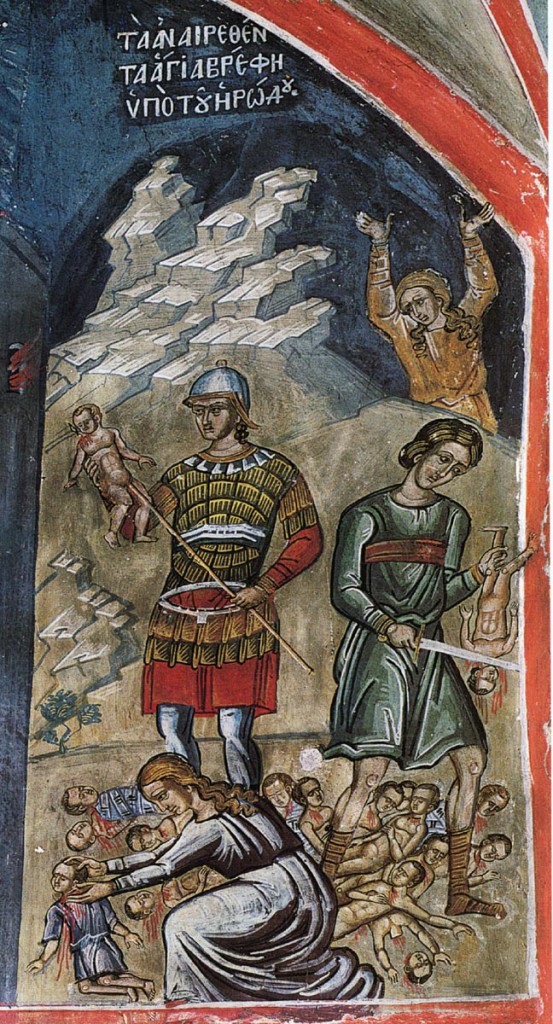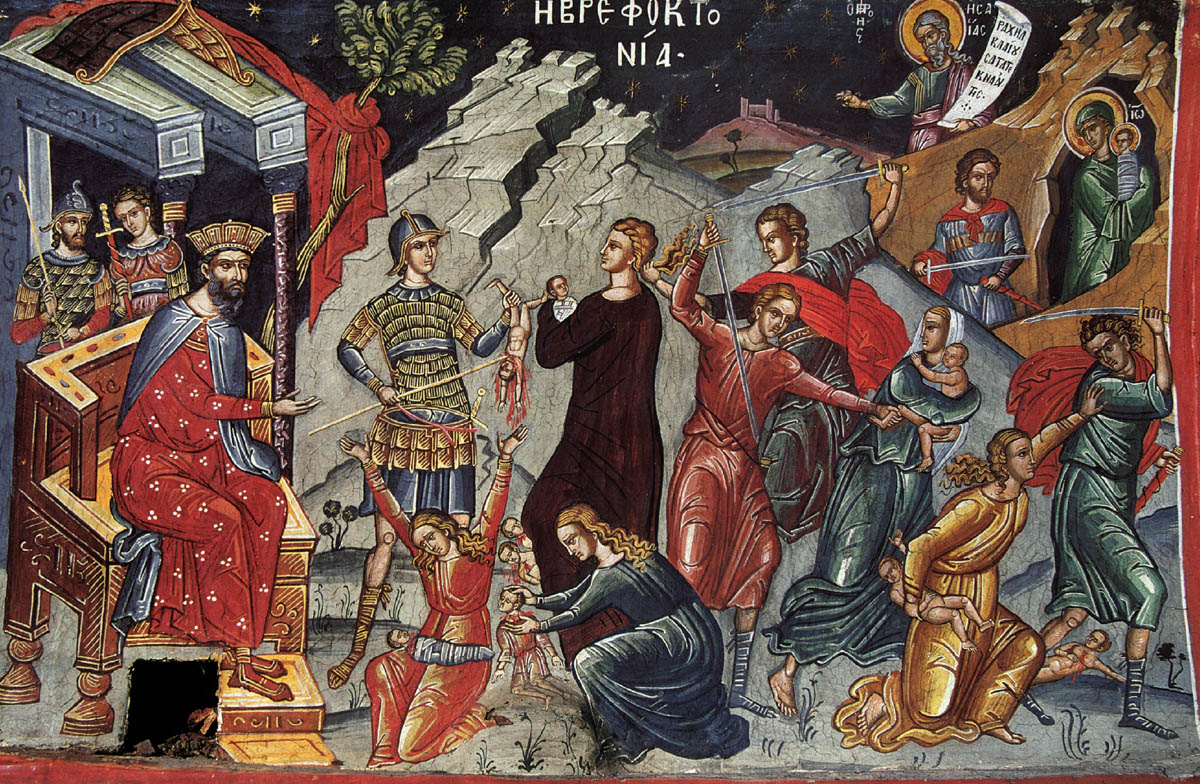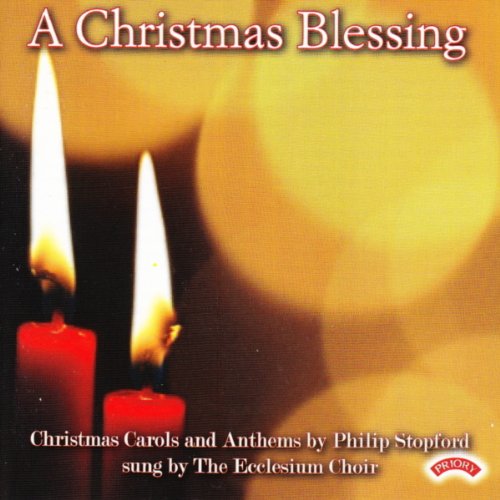
Monday was Christmas.
Today is Childermas, the Feast of the Holy Innocents.
The “Coventry Carol”, a lullaby of mothers to doomed children, dates to the 16th century. It was part of a Mystery Play, “The Pageant of the Shearmen and Tailors”, about chapter two of the Gospel of Matthew.
The carol is about the Massacre of the Holy Innocents.
Lully, lulla, thou little tiny child,
By by, lully lullay, thou little tiny child,
By by, lully lullay.
O sisters too, How may we do
For to preserve this day
This poor youngling,
For whom we do sing,
By by, lully lullay?
Lully, lulla, thou little tiny child,
By by, lully lullay, thou little tiny child,
By by, lully lullay.
Herod, the King, In his raging,
Charged he hath this day
His men of might,
In his own sight,
All young children to slay.
Lully, lulla, thou little tiny child,
By by, lully lullay, thou little tiny child,
By by, lully lullay.
That woe is me, Poor child for thee!
And ever morn and day,
For thy parting
Nor say nor sing
By by, lully lullay!
We could sing it on every street corner.
The carol came to greater popularity after the BBC broadcast it at Christmas of 1940, after the Bombing of Coventry: it was sung in the ruins of the bombed Cathedral.
 There is sometimes attributed (wrongly) to St. Augustine a quote about the Holy Innocents with some beautiful imagery. Here it is… mind you, attributed to the Doctor of Grace:
There is sometimes attributed (wrongly) to St. Augustine a quote about the Holy Innocents with some beautiful imagery. Here it is… mind you, attributed to the Doctor of Grace:
These then, whom Herod’s cruelty tore as sucklings from their mothers’ bosom, are justly hailed as “infant martyr flowers”; they were the Church’s first blossoms, matured by the frost of persecution during the cold winter of unbelief.
Lovely, no? Augustine didn’t say that. It was Caesarius of Arles who preached:
Quos herodis impietas lactantes matrum uberibus abstraxit; qui iure dicuntur martyrum flores, quos in medio frigore infidelitatis exortos velud primas erumpentes ecclesiae gemmas quaedam persecutionis pruina decoxit. [s. 222, 2 in CCL 104]
Literally: Whom the impiety of Herod dragged from their mothers’ breasts; who rightly are called the flowers of the martyrs, whom, having sprung up in the midst of the cold of infidelity, bursting forth as the Church’s first jewels, a certain frost of persecution wasted.
or
Whom the ungodliness of Herod dragged as nursing babies from their mothers’ breasts; who rightly are called the flowers of martyrs, whom the frost of persecution cooked up, grown up in the midst of the cold, bursting forth as the first buds of the Church.
 Some interesting things are going on in the Latin. First, you need to know that gemma isn’t just “gem”, but can also be “bud, blossom”. In Latin there are two related verbs, lacto, lactare, “to contain milk, to give suck”, and lacteo, lactere, “to suck milk, to be a suckling”. However, in all periods they swap meanings. We could use one English verb for both, “to nurse”. This is also why we for the famous line “out of the mouth of infants and of sucklings” both “ex ore infantium et lactentium” and “ex ore lactantium”.
Some interesting things are going on in the Latin. First, you need to know that gemma isn’t just “gem”, but can also be “bud, blossom”. In Latin there are two related verbs, lacto, lactare, “to contain milk, to give suck”, and lacteo, lactere, “to suck milk, to be a suckling”. However, in all periods they swap meanings. We could use one English verb for both, “to nurse”. This is also why we for the famous line “out of the mouth of infants and of sucklings” both “ex ore infantium et lactentium” and “ex ore lactantium”.
By the way, if you like this drilling into Latin, try Latin Synonyms, with Their Different Significations, and Examples Taken from the Best Latin Authors, by M. Jean-Baptiste Gardin Dumesnil, translated into English, with additions and corrections, by the Rev. J. M. Gosset. US HERE – UK HERE
Decoquo is “to waste” or “to reduce by boiling”. I found an interesting reference in Suetonius how Nero made a icy-cold drink decoction, a decocta. Pliny uses decoctum as a medicinal drink. Note the juxtaposition of the heat indicated in decoquo and the cold of frost. The cold heat of persecution brought forth flowers before their day.
Here is the Collect from the 1962 Missale Romanum:
Deus, cuius hodierna die praeconium Innocentes Martyres non loquendo, sed moriendo confessi sunt: omnia in nobis vitiorum mala mortifica; ut fidem tuam, quam lingua nostra loquitur, etiam moribus vita fateatur.
O God, whose public heralding the Innocent Martyrs professed this very day not by speaking but by dying; mortify in us every ill of vices; so that (our) life might confess Your Faith, which we speak with our tongue, also by (our) morals.
Look at the not-so-subtle change made to the Collect by the cutters and pasters who glued together the Novus Ordo:
Deus, cuius hodierna die praeconium
Innocentes Martyres non loquendo,
sed moriendo confessi sunt:
da, quaesumus, ut fidem tuam,
quam lingua nostra loquitur
etiam moribus vita fateatur.
Can you spell “bowdlerize”?
LITERAL VERSION:
O God, whose public heralding the Innocent Martyrs
professed this very day not by speaking but by dying;
grant, we implore, that (our) life might confess Your Faith,
which our tongue declares,
also by (our) morals.
That lingua nostra could, I suppose, be ablative, but it is probably the nominative subject of loquitur. I originally swerved that into “which we speak with our tongue”. There is a strong temptation to reconstruct these clauses when rendering it into English.
NEW CORRECTED VERSION:
O God, whom the Holy Innocents confessed
and proclaimed on this day,
not by speaking but by dying,
grant, we pray,
that the faith in you which we confess with our lips
may also speak through our manner of life.
Did the translator not get that fateor is deponent? The subject is vita, no? Accusative fidem is the object, not the subject.
What a mess.
OBSOLETE ICEL:
Father,
the Holy Innocents offered you praise
by the death they suffered for Christ.
May our lives bear witness
to the faith we profess with our lips.
I’ll stick with the older Collect in Latin, thank you very much.
St. Thomas Aquinas dealt with the question of how the Innocents could be considered martyrs if they didn’t yet have use of their free will so as to be able to choose death in favor of Christ and if they were not baptized.
The Angelic Doctor answered that God permitted their slaughter for their own good and that their slaying brought them the justification and salvation that would also come from baptism.
This was a “baptism of blood”. In their deaths they were truly martyrs. And they were indeed for Christ, since Herod, fulfilling the prophecy of Jeremiah 31:15, killed them from ill-will for the new-born Christ.
And a modern reworking of Lully Lulla Lullay by Philip Stopford which might quite simply make you choke up and then, at the descant about 3:30, completely lose it.
Like it?





































I like the Traditional version of the Coventry Carol. I like the paintings you’ve chosen;all the paintings of the massacre of the Innocents and the painting of The Holy family’s flight to Egypt. They compliment each other and one can see the seriousness of what happened and how sad and dangerous the flight to Egypt was.
Thank you for this beautiful combined reflection and education, in the best tradition of WDTPRS.
The Dublin Latin Mass chaplaincy switched its 9.00 a.m. Mass to 11.30, as the Mass for the Feast of the Holy Innocents plus “for the defence of the unborn”. How fitting, given we’ll have the horrible, rigged-up, referendum on removing our specific constitutional protection for the unborn sometime in 2018. I couldn’t attend due to work, but I hope it was packed! And even if there were few there – well, the Mass is of infinite value.
The Maledictory Psalms would be appropriate – not to mention a general exorcism!
Thanks for the context Fr.
@jaykay It was indeed packed, and the choir (Ite O’Donovan’s https://www.facebook.com/piccololasso) ensured the car park was limited well before the Mass. Fr Nevin offered the Mass for the Holy Innocents but also for the defeat of that evil intended referendum.
I would say on the Referendum that while there is a major political effort to push through a latterday Massacre of the Innocents, most Fianna Fáil TDs support the Eight Amendment, and that Dail Committee provides a guide on which Parties are the most pro-Death. Provisional Sinn Féin, Fine Gael too, are no surprise, and some FFers are unsound too. It is a sort of voting guide.
Prayerful: that’s good to hear, thanks. I did expect that it would be crowded, but nice to have it confirmed. Yes, that Committee really has shown what it’s all about – hence “rigged”. As for Sinn Féin supporting the amendment – well, they’ve been supporting murder (and criminality) for decades, so no surprise there! Still, there is hope for its defeat. D.G.
And Herod the Great died raving!
Just, sicut dicitur, sayin’ ;\